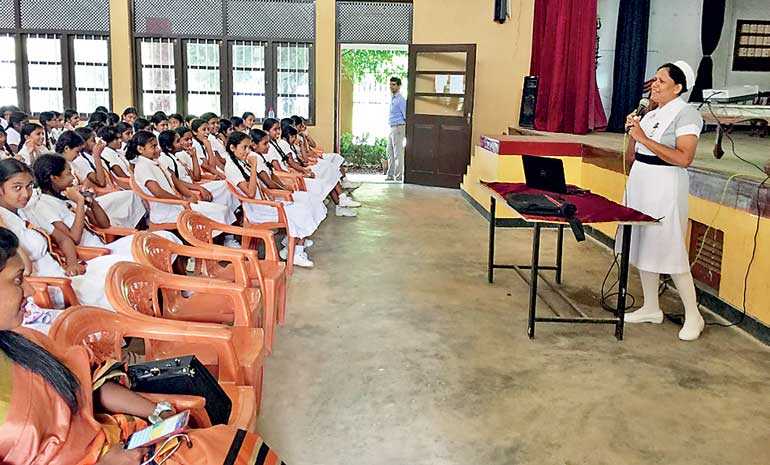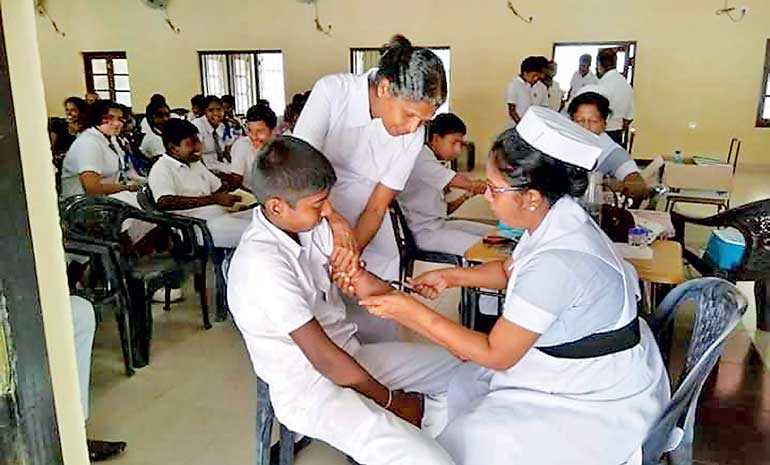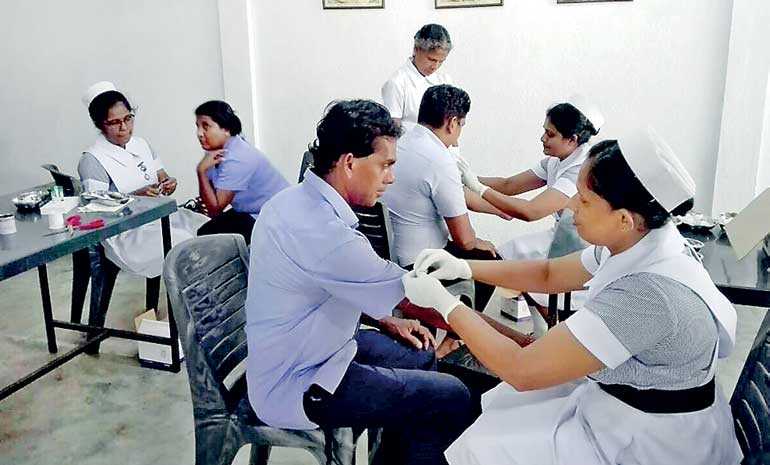Thursday Feb 19, 2026
Thursday Feb 19, 2026
Tuesday, 25 September 2018 00:00 - - {{hitsCtrl.values.hits}}

Thalassaemia Awareness sessions conducted for students

Thalassaemia Screening Program conducted for students

Thalassaemia Screening Program conducted for adults
By P.R.D.R. Piyathunga
Thalassaemia is recognised as a common genetic disorder in Sri Lanka. The disease occurs due to haemoglobin, the main component of red blood cells not been produced in sufficient quantities.
Treating low blood cells of thalassaemia, result in iron accumulation within vital organs, and if it is not treated, it can result in complications and abnormalities, especially affecting the growth and development of children.
For patients diagnosed with the disease, blood transfusions must be given once in 2-3 weeks or monthly. In addition, they have to live with a fitted device that removes the excess iron from the body, consuming medicine daily in the morning after fasting and undergo severe hardships.
During the first year of a child’s birth, thalassaemia can be diagnosed and these children will have to receive treatment from then onwards until their entire lifetime.
As this disease is life-threatening, lack of regular treatment will result in death. Due to these reasons, the affected children face physical and mental depression while the parents too, endure mental, social and economic decline.
Due to all these issues, we should all join together in order to effectively help and support to prevent thalassaemia.
In the case of thalassaemia, there are carriers of the disease who don’t have any symptoms or clinical effects. They are identified through blood tests and are not in danger of the disease. As they do not display any ill effects they live a completely normal, healthy life, free of symptoms.
Unfortunately, if two carriers marry and have children, there is a high probability that the child may fall as a victim to life-threatening thalassemia.
The main aim of the thalassemia prevention program is to advice younger couples before marriage to take a blood test and check for the presence of the faulty gene responsible in causing thalassemia. This could help in taking better decisions and avoid giving birth to children with thalassemia.
There are many facilities in the treatment and care of thalassemia in Sri Lanka, especially the dedicated Adolescent and Adult Thalassaemia Care Unit at the North Colombo Teaching Hospital, Ragama located at No: 10, Srimavo Bandaranayake Mawatha, Mahara, Kadawatha.
This unit is dedicated to the treatment and management of adolescent and young patients afflicted with thalassaemia and also the only unit in Sri Lanka dedicated for the management of adult thalassaemic patients.
While all services and treatments are supplied free of charge, it is also the sole Government unit in the Western Province committed to treat thalassaemic patients. Additionally, other treatment centres have also been established in collaboration with teaching hospitals located in Kurunegala, Badulla and Anuradhapura.
At these centres, individuals are screened by conducting a blood test to identify carriers. If identified as a carrier they are given a pink card and if not a carrier they are presented a green card. This in effect becomes their identification card for thalassaemia.
For young couples looking to get married, this card will serve as a carrier status. This enables the young couples to make better decisions and to reduce the risks of giving birth to offspring with the life-threatening and dreaded thalassaemia disease.
Marriage with a pink cardholder, without previously testing one’s blood could lead to an ‘unsafe marriage’. Additionally, both partners also not testing their blood prior to marriage could lead to an ‘unsafe marriage’.However, if both are holders of green cards or if one has a green card and the partner a pink card, these marriages can be deemed ‘safe marriages’. Thus it is imperative and extremely advisable that both individuals understand and know their carrier status prior to marriage.
Youth in the Western Province can now receive information, advice and other services from the centre. In addition, the centre aims to visit universities and schools to conduct public awareness sessions and educate youth on the thalassaemia disease.
As a novel initiative of Union Assurance’s unique corporate social responsibility brand, ‘Union Manushyathwaya’, the organisation is working in collaboration with the National Thalassemia Centre contributing invaluable support through resources, effort and financial assistance conducting thalassemia awareness and prevention campaigns helping to create healthier and secure communities.
(The writer is Nursing Officer In charge, Thalassaemia Unit, North Colombo
Teaching Hospital.)